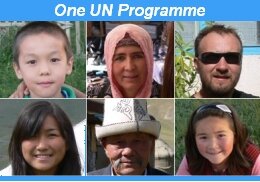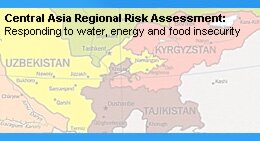| The “Day of Three Laws” in Kyrgyzstan |
|
|
| Categories: (Other Documents | Document Database | UN Agencies | UNICEF) |
|
17 March 2009 can go down in history as UNICEF’s “Day of Three Laws” in Kyrgyzstan, and as an important step on the path to development of state policy to improve the health and development of all children in Kyrgyzstan. It was on this day that the Law on Breastfeeding and Marketing of Breast Milk Substitutes came into force.On the very same day, the President signed the Law on Fortification of Baking Flour, while also on 17 March 2009, in Bishkek an open parliamentary hearing was held on the draft Law on Preschool Education. All three laws will play defining roles in the improving the health and development of children in Kyrgyzstan and reflect the importance of the link between nutrition and early childhood stimulation on child development. UNICEF has actively provided technical support when all these laws were being developed and promoted in the country. The Law on Breastfeeding and Marketing of Milk Substitutes: In the name of improving the health of the nation The Law on Breastfeeding and Marketing of Milk Substitutes serves as a witness to the commitment of the country to increase the rate of exclusive breastfeeding and recognized that breastfeeding is best nutrition for babies up to the age of six months. As Tim Schaffter, UNICEF Representative in Kyrgyzstan, noted in a presentation, this law is unique in that it does not require significant budgetary resources for implementation, and what is more, actually will lead to a reduction in state spending on heath care due children having fewer infectious due to the protective qualities of breast milk. At the same time increasing breastfeeding is reducing the expenditure of families on milk substitutes for infants. A working group made up of lawyers with significant experience of working with Kyrgyzstan’s parliament, nutrition specialists from the Ministry of Health, leading national experts and decision makers spent two years developing the draft law. During this period, many documents were studied, and a range of assessments, research studies and evaluations were carried out. After this stage was completed, open parliamentary hearings were held on the draft law, at the local level, in the regions, and also in Bishkek. At the same time, with the support of UNICEF and interested partners, the national mass media was mobilized. As a result, national publications and information agencies published 59 articles and a number of radio and television programmes went on air, which highlighted the importance of breast milk and the need to regulate the marketing of milk substitutes in the country. The key for successful passage of the law through parliamentary committees was information on the prevalence of anaemia and stunted growth among children in Kyrgyzstan, the high level of infant mortality and other important evidence, which UNICEF regularly provided to the initiative group of parliamentarians. Some deputies, including Dinara Moldosheva, Gulnara Derbisheva and Irina Letova combined forces, as they stressed, in the name of improving the health of the nation. Another serious argument, both during the open hearings, and during consideration of the bill in committees and in plenary sessions of parliament was the example of Dinara Moldosheva, an active deputy and mother of three children, the youngest of whom (2 ½ years old) is breastfed by the parliamentarian. In Kyrgyzstan women have never covered their faces, and traditions have never infringed the dignity of women. However, even now, not all women sum up the resolve to make such open public statements, knowing the prejudice and stereotypes that exist in the country. As a result of a well thought out strategy to promote the bill, the draft law successfully passed through the parliamentary committee stage, was approved by a majority vote in parliament and in less than three weeks was signed by the President. However, the process only appears easy and smooth at first sight. National experts and members of the working group that developed and promoted the Law note that supporters of the proposals had to defeat a fierce hidden campaign by milk substitute producing companies. The influence of these companies and attempts to prevent the passing of the law were felt in all stages of the process. Nevertheless, the commitment of the deputies, and the unity and perseverance of the members of the working group and all interested partners, including the mass media, meant that they succeeded relatively quickly. David Clark, a nutrition specialist in UNICEF’s headquarters in New York, noted that those who promote such laws always face obstacles on the way, and rarely have achieved such good results in such a short period of time. In this regard the role that David himself played must be noted, as well as the role of International Baby Food Action Network (IBFAN) specialists in the process. Communication with the Nutrition Department of UNICEF headquarters and IBFAN can be compared to a continuous two-sided production line. In the Law’s parliamentary committee stage and during plenary sessions, both David and IBFAN specialist were always online, providing distant consultancy in order to ensure the successful passing of the Law. In the course of the Law implementation International Code of Breast Milk Substitutes Marketing will be closely monitored in the Kyrgyz Republic and any criminal activities by the companies will be made public and dealt with according to the Law. Kyrgyz Parliament will also oversee the Law. The Law on Fortification of Baking Flour: Bread baked from fortified flour makes you healthy The Law on Fortification of Baking Flour was designed to help resolve the problem of “hidden hunger” in Kyrgyzstan, as the deficit of vitamins and micronutrients, including iron, have been termed by specialists. The whole population suffers from this deficit, primarily children, pregnant women and feeding mothers. As noted by the experts who designed the Law and considered it in parliamentary committees, solving the problem of micronutrients deficiency is one of the most urgent tasks in the country. This is particularly true given the fact that expenses to resolve this problem are one tenth of the economic cost of micronutrient deficit. It is well know that iron deficit leads to delayed intellectual and physical development in children, reproductive disorders among women, high maternal mortality, weakening of the immune system, and a reduction in labour productivity. At the end of 2008, the average frequency of iron deficiency anaemia among children and women in Kyrgyzstan was 50 per cent, and in Talas Province, for example, the figure was 70 per cent. Lack of folic acid in pregnancy leads to children becoming deaf or has other hearing problems and is a major cause of spina bifida - problem with the development of the spine cord. Despite this, the Law has a long and complicated history in Kyrgyzstan. Work on the draft Law began more than 10 years ago, but deputies from a number of convocations of parliament systematically rejected the draft law, or else delayed scrutiny of the important document for the health of the nation. Nevertheless, UNICEF continued to give technical support to the law throughout the period, and stimulated the working group, implemented pilot projects on flour fortification in small mills, supported the creation of the Association of Mills of Kyrgyzstan, helped to carry out research on iron deficiency and on the draft law, and carried out information campaigns. The strategy to promote the Law on fortified flour in its final stages also included public hearings in the north and south of the country and in the capital, Bishkek, and the support of the media. However one of the most effective steps was the provision of parliamentarian Osmonbek Artykbaev with important information about the prevalence of anaemia in Kyrgyzstan. As a result, the Law on Fortified Flour was approved by a majority in February, and signed by the President on 17 March. It will come into force three months after the President’s signature. Law on Preschool Education: Guaranteeing state investment in the future of Kyrgyzstan’s children “If it is ratified, Kyrgyzstan will become the first country in Central Asia to pass a Law on Preschool Education,” said Rajae Msefer Berrada, Deputy Representative of UNICEF in Kyrgyzstan at an open parliamentary hearing on the draft Law on Preschool Education, held in Bishkek on 17 March 2009. Currently only 11 per cent of preschool children in Kyrgyzstan have the chance to attend kindergartens and be prepared to go to school. As a result of a shortage of preschool institutions, high poverty rates, particularly in remote rural areas of the country and a number of other factors that negatively impact this sector of public services; the level of basic knowledge of schoolchildren has been in steady decline. Therefore, in June 2007, the Ministry of Education asked UNICEF to provide technical and financial support to develop a draft Law on Preschool Education. In a relatively short time, a working group prepared a draft document, which was approved at initial hearings in Ministries and Agencies, and has already been widely discussed by all interested parties. On 17 March 2009, the revised draft Law was considered at an opening parliamentary hearing with the participation of the Vice Prime Minister, the Minister of Labour and Social Development, the Minister of Education and the Chair of the Parliamentary Education Committee, 12 parliamentarians, heads of local government from all regions, international experts, practitioners and specialists in the field of early childhood development. During the hearing a number of constructive suggestions were made to improve the draft Law. Many participants in the debate noted that since the dissolution of the Soviet Union, nobody in Kyrgyzstan has seriously tackled the development of the preschool sector, and only international organisations have periodically reminded their partners in the government about the problems and the need to resolve them. As a result out of 1600 preschool institutions operating in the 1990’s only a quarter (400) remained in services, continuing to provide preschool education. The rest of the kindergartens were closed, reallocated, sold as private property, destroyed, or turned over to state institutions with absolutely no connection to early childhood development. Currently, thanks to the efforts of international organisations, including UNICEF the number of preschool educational institutions has reached 503 and continues to rise. However, according to national experts, there are a range of discrepancies in Kyrgyz legislation, including the Law on Education, the Family Code and the Children’s Code, and therefore it is necessary to define, in a legal framework, the basic direction of state policy in the field of preschool education and to give equal opportunities to all children in Kyrgyzstan for care and development. The draft Law still has a long path ahead of amendments, agreements, discussion and debates before it is brought to its first committee hearings in parliament. However, the first step has already been made – a group of supporters of this important Law has been put together. The participants at the debate expressed the hope that the process of lawmaking will not take a long time, as the lack of a state policy in the field of preschool education is having a markedly negative impact on the growth of human potential, and is putting economic development at risk. Olga Grebennikova |





















